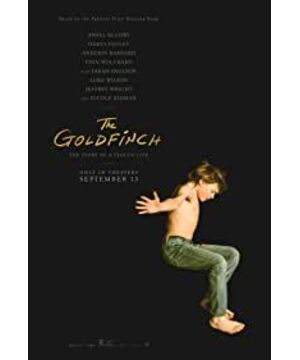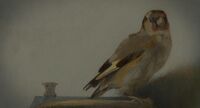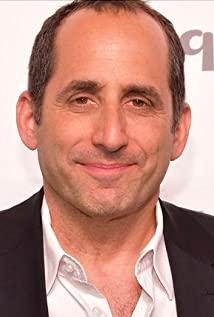I haven't read the original novel, so I didn't have high expectations for the film. Maybe that's why I thought the movie was well done.
So this movie review is not something worth watching seriously, after all, I haven't even read the original book.
I personally think it's a story about how a person breaks free from the shackles of the past to find happiness. The painting "Goldfinch" is an image of the shackles of the protagonist's boyhood. In the original painting of The Goldfinch, the bird is clearly seen in chains. This corresponds to the image of the teenage protagonist in the film poster jumping into the pool topless. Like a bird spreading its wings? And like the bird in the painting, the boy in the poster occupies a position to the right in the picture. So far, I think what the creator wants to express is very clear...
The painting "Goldfinch" imprisoned the male protagonist in three ways.
First of all, it represents the only remaining connection between the male protagonist and his mother. The male protagonist lost his mother in the attack, and has been immersed in the sadness and self-blame of the incident, unable to extricate himself. Just because my mother said she liked this painting during her lifetime, the male protagonist was reluctant to put it down after he got it by chance. That's right, this painting is priceless, but the male protagonist didn't own it for money at all, so that the male protagonist never found out after his friend took the painting off. That is to say, he never bothered to tear apart the newspapers to appreciate the valuable paintings, but was just content to hold the obsession wrapped in newspapers when he missed his mother-even if the newspapers were actually just A copy of the preparation material for the U.S. Citizenship Test.
Secondly, it has become the biggest hidden worry under the glamorous life of the male protagonist after he becomes an adult. Growing up means that everyone has secrets to some degree. And the private collection of famous paintings is undoubtedly the most shameful thing the male protagonist has ever done. Although the male protagonist lost his mother and father successively when he was young, it has to be said that he was treated with kindness by the world. When he grows up, he has a decent job, and his image is sunny and handsome. It seems almost perfect to outsiders, except that he still takes drugs because of the loss of his mother. But only he knew (well, he thought he knew) that he was hiding enough evidence to ruin his name in the storage room he rented, especially since he's still in the antique world. As a professional, the private collection of cultural relics that should belong to the museum and belong to all mankind. If this matter is known, it will be shameless to go on with it anyway. No one will listen to his arguments. No one would understand his grief at the loss of his mother. No one will accept any of his rhetoric and excuses. The consolation that comforted the loss of a mother as a child became a talisman in adulthood.
In the end, it also carries the male protagonist's obsession with love (well, this is a bit far-fetched, I'm just talking nonsense to get a "three"). The woman the male lead really loves is the girl who also survived the attack (I decided to call her the female lead, and the girl the male lead married seemed to play the role of the second female lead). It was the girl's uncle who instructed the young man to put away the dusty painting before he died, and that's how the story came about. As an old man who loves art, it should be out of instinct to ask the male protagonist to keep the artwork when he is dying. He would not have thought that this painting and the ring he used as a token would drastically change the male protagonist's life. I never thought that the male protagonist's affection for his niece would become stronger because of the karma drawn from this painting. The hero, like the heroine, lost everything in the attack. He can only find true empathy in the heroine. Ordinary people can understand the pain of losing his mother at a young age (well, so he later played very well with his Russian friend who lost his mother at a young age). However, this is destined to be a love without results. Even if the female protagonist admits her feelings for the male protagonist, she cannot accept the male protagonist. As she said, how can two people who have been so severely traumatized together rely on each other? Although cruel at first glance, it is not unreasonable. The male protagonist is still someone who needs to take drugs from time to time to relieve himself. How can we truly protect the equally vulnerable female protagonist?
In this way, a piece of "The Goldfinch" entrusts, and also kidnaps, the male protagonist's family, career, and love. Like a bird in a painting, the male protagonist is not a bound life. I can't get rid of the grief and self-blame for the deceased relatives, the self-blame and fear for the act of privately collecting famous paintings, and the helplessness of not being able to love.
The process of breaking the shackles is also the process of finding new family and love, and finding redemption by finding lost paintings. Fortunately, the male lead was finally found. The treasure hunt in Germany was a near miss. Although the painting did not get it by myself, it was returned to the original owner when it was finally obtained by the police; even though no one left with the fiancée and the second daughter, we couldn’t live the kind of earth-shattering cry of ghosts and gods. A love story, but it can be regarded as a good match for talents and women; the second girl belongs to the kind of lady who has been happy and happy since childhood, and has a strong inner self-confidence. Presumably, for the male protagonist with traumatic experience, although he cannot achieve complete empathy and understanding, it is also It is a good spiritual support; not to mention the future mother-in-law (that is, the past adoptive mother), it really is the mother-in-law who sees her son-in-law more and more happy. Although not as intimate as his biological mother, he also loves art and is equally elegant and calm. For the male protagonist, what can the husband ask for?
The overall film is still very warm and well done. The part where the male protagonist lives with his father and stepmother and spreads dog food with his Russian friends is a little long. But seriously, if you really want to cut that part of the plot, it will cause the audience to be confused about the subsequent development of the story. The lesser of two evils, keep it
View more about The Goldfinch reviews











